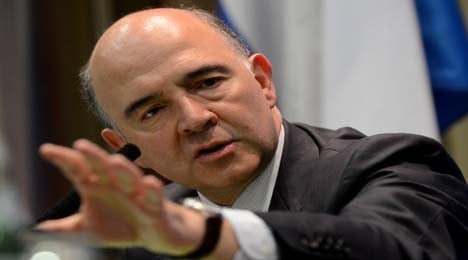Earlier this year Pierre Moscovici was booted out of France’s top finance job, but now he looks set to land one in Brussels. That’s unless Germany manage to thwart his bid to become the EU commissioner for Economic and Monetary Affairs.
Jean-Claude Juncker, the newly elected President of the European Commission, is believed to have already earmarked Moscovici to succeed Olli Rehn, if he is nominated as France’s representative on the Commission.
But reports in Le Monde on Wednesday claim Angela Merkel and her finance minister Wolfgang Schäuble are not keen on Moscovici being given a role that allows him to evaluate and sanction member states’ budgets and reforms, given the fact that France has been unable to meet EU deficit targets.
Merkel who is in Brussels with other EU leaders to thrash out who gets the tops jobs, may yet throw a spanner in the works.
“If we name the ex-French minister for finance to be the commissioner for Economic and Monetary Affairs, who did nothing to enforce the stability pact, it like trying to hunt for the devil using Beelzebub,” German MP Norbert Bathle, from Merkel’s CDU party, told the newspaper Handelsblatt this week.
Germany has long been irritated by France’s inability to respect an EU set target that forced France it to bring its deficit down to below the threshold of 3 percent of its GDP.
The European Union in June last year agreed to give France an extra two years, until 2015, to bring its deficit under the EU-agreed ceiling.
There has been talk recently of Paris approaching Brussels for a further extension, although new Finance Minister Michel Sapin has insisted the deadline will be met.
Germany’s own finance minister Wolfgang Schäuble said as recently as last week that France must respect the agreements to reign in its public debt.
On Wednesday a spokesman for the French government refused to respond to German concerns simply telling Les Echos newspaper: “What is important is that the new European Commission and its members are committed to what the Council decides, knowing that the stability and growth pact prevails.”
In Brussels on Wednesday President François Hollande could have a tough job to convince Merkel of the merits of the man he wants on the Commission. His only chance might be to convince the German chancellor that France's economy is heading in the right direction.
No announcement is likely to be made on Wednesday surrounding Moscovici, who is still not assured of being nominated as France's representative on the Commission, with former Justice Minister Elisabeth Guigou also pushing her case for the role.
EU leaders in Brussels are however expected to decide who will fill the top roles of EU foreign policy chief and European Council President.
Our colleagues at The Local Italy are covering those talks in their live blog. You can keep up to date with the action by clicking here.



 Please whitelist us to continue reading.
Please whitelist us to continue reading.
Member comments